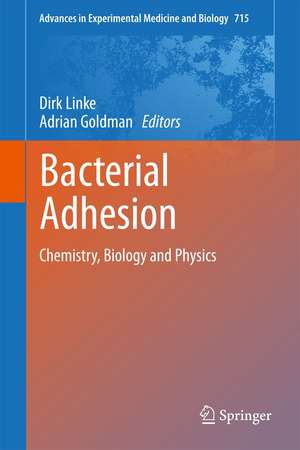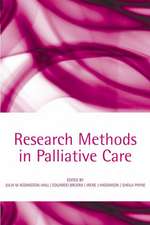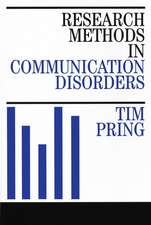Bacterial Adhesion: Chemistry, Biology and Physics: Advances in Experimental Medicine and Biology, cartea 715
Editat de Dirk Linke, Adrian Goldmanen Limba Engleză Paperback – 15 iul 2013
| Toate formatele și edițiile | Preț | Express |
|---|---|---|
| Paperback (1) | 1478.46 lei 43-57 zile | |
| SPRINGER NETHERLANDS – 15 iul 2013 | 1478.46 lei 43-57 zile | |
| Hardback (1) | 1798.83 lei 43-57 zile | |
| SPRINGER NETHERLANDS – 12 mai 2011 | 1798.83 lei 43-57 zile |
Din seria Advances in Experimental Medicine and Biology
- 9%
 Preț: 719.56 lei
Preț: 719.56 lei - 5%
 Preț: 717.00 lei
Preț: 717.00 lei - 5%
 Preț: 717.00 lei
Preț: 717.00 lei - 15%
 Preț: 640.24 lei
Preț: 640.24 lei - 5%
 Preț: 715.71 lei
Preț: 715.71 lei - 5%
 Preț: 716.28 lei
Preț: 716.28 lei - 20%
 Preț: 691.93 lei
Preț: 691.93 lei - 5%
 Preț: 1031.00 lei
Preț: 1031.00 lei - 5%
 Preț: 820.42 lei
Preț: 820.42 lei - 5%
 Preț: 716.28 lei
Preț: 716.28 lei - 15%
 Preț: 641.38 lei
Preț: 641.38 lei - 5%
 Preț: 717.20 lei
Preț: 717.20 lei - 5%
 Preț: 715.35 lei
Preț: 715.35 lei - 5%
 Preț: 1113.83 lei
Preț: 1113.83 lei - 20%
 Preț: 1161.71 lei
Preț: 1161.71 lei - 5%
 Preț: 1170.51 lei
Preț: 1170.51 lei - 18%
 Preț: 1119.87 lei
Preț: 1119.87 lei - 5%
 Preț: 1288.48 lei
Preț: 1288.48 lei - 5%
 Preț: 1164.67 lei
Preț: 1164.67 lei - 5%
 Preț: 1101.73 lei
Preț: 1101.73 lei - 18%
 Preț: 1123.67 lei
Preț: 1123.67 lei - 5%
 Preț: 1435.64 lei
Preț: 1435.64 lei - 20%
 Preț: 1044.10 lei
Preț: 1044.10 lei - 18%
 Preț: 946.39 lei
Preț: 946.39 lei - 5%
 Preț: 292.57 lei
Preț: 292.57 lei - 18%
 Preț: 957.62 lei
Preț: 957.62 lei - 18%
 Preț: 1235.76 lei
Preț: 1235.76 lei - 5%
 Preț: 1231.55 lei
Preț: 1231.55 lei - 5%
 Preț: 1292.30 lei
Preț: 1292.30 lei - 5%
 Preț: 1102.10 lei
Preț: 1102.10 lei - 18%
 Preț: 1132.81 lei
Preț: 1132.81 lei - 5%
 Preț: 1165.19 lei
Preț: 1165.19 lei - 5%
 Preț: 1418.48 lei
Preț: 1418.48 lei - 5%
 Preț: 1305.63 lei
Preț: 1305.63 lei - 18%
 Preț: 1417.72 lei
Preț: 1417.72 lei - 18%
 Preț: 1412.99 lei
Preț: 1412.99 lei - 24%
 Preț: 806.15 lei
Preț: 806.15 lei - 18%
 Preț: 1243.29 lei
Preț: 1243.29 lei - 5%
 Preț: 1429.44 lei
Preț: 1429.44 lei - 5%
 Preț: 1618.70 lei
Preț: 1618.70 lei - 5%
 Preț: 1305.12 lei
Preț: 1305.12 lei - 18%
 Preț: 1124.92 lei
Preț: 1124.92 lei - 5%
 Preț: 1097.54 lei
Preț: 1097.54 lei - 15%
 Preț: 649.87 lei
Preț: 649.87 lei - 5%
 Preț: 1097.54 lei
Preț: 1097.54 lei - 18%
 Preț: 945.79 lei
Preț: 945.79 lei - 5%
 Preț: 1123.13 lei
Preț: 1123.13 lei - 20%
 Preț: 816.43 lei
Preț: 816.43 lei
Preț: 1478.46 lei
Preț vechi: 1556.28 lei
-5% Nou
Puncte Express: 2218
Preț estimativ în valută:
282.90€ • 296.16$ • 234.08£
282.90€ • 296.16$ • 234.08£
Carte tipărită la comandă
Livrare economică 07-21 aprilie
Preluare comenzi: 021 569.72.76
Specificații
ISBN-13: 9789400736054
ISBN-10: 9400736053
Pagini: 388
Ilustrații: XIV, 374 p.
Dimensiuni: 155 x 235 x 20 mm
Greutate: 0.56 kg
Ediția:2011
Editura: SPRINGER NETHERLANDS
Colecția Springer
Seria Advances in Experimental Medicine and Biology
Locul publicării:Dordrecht, Netherlands
ISBN-10: 9400736053
Pagini: 388
Ilustrații: XIV, 374 p.
Dimensiuni: 155 x 235 x 20 mm
Greutate: 0.56 kg
Ediția:2011
Editura: SPRINGER NETHERLANDS
Colecția Springer
Seria Advances in Experimental Medicine and Biology
Locul publicării:Dordrecht, Netherlands
Public țintă
ResearchCuprins
1. Adhesins of human pathogens from the genus Yersinia; 2. Adhesive mechanisms of Salmonella enteric; 3. Adhesion Mechanisms of Borrelia burgdorferi; 4. Adhesins of Bartonella spp.; 5. Adhesion Mechanisms of Plant-Pathogenic Xanthomonadeae; 6. Adhesion by Pathogenic Corynebacteria; 7. Adhesion Mechanisms of Staphylococci; 8. Protein Folding in Bacterial Adhesion: Secretion and Folding of Classical Monomeric Autotransporters; 9. Structure and Biology of Trimeric Autotransporter Adhesins; 10. Crystallography and EM of chaperone/usher pilus systems; 11. Crystallography of Gram-positive Bacterial Adhesins; 12. The nonideal coiled coil of M protein and its multifarious functions in pathogenesis; 13. Bacterial Extracellular Polysaccharides; 14. Carbohydrate mediated bacterial adhesion; 15. The Application of NMR Techniques to Bacterial Adhesins; 16. Electron microscopy techniques to study bacterial adhesion; 17. EM Reconstruction of Adhesins: 18. Atomic force microscopy to study intermolecular forces and bonds associated with bacteria; 19. Assessing Bacterial Adhesion on an Individual Adhesin and Single Pili Level using Optical Tweezers; 20. Short time-scale bacterial adhesion dynamics; 21. Deciphering Biofilm Structure and Reactivity by Multiscale Time-resolved Fluorescence Analysis; 22. Inhibition of Bacterial Adhesion on Medical Devices.
Textul de pe ultima copertă
Adhesion plays a major role in the bacterial lifestyle. Bacteria can adhere to organic and inorganic surfaces, to each other, and of course to host cells during pathogenesis.
The focus of this book is: how are such adhesion phenomena best studied? Microbial genetics experiments have greatly enhanced our knowledge of what bacterial factors are involved in adhesion. For numerous reasons, though, biochemical and structural biology knowledge of the molecular interactions involved in adhesion are limited. One major problem has been a lack of interdisciplinary research and understanding in the field. On the one hand, the microbiologists lack detailed knowledge of the biophysical possibilities and have limited access to the frequently expensive instrumentation involved while on the other hand, the experts in these methods frequently do not have access to the biological materials, nor do they necessarily understand the biological questions to be answered. The purpose of this book is thus to overcome this gap in communication between researchers in biology, chemistry and physics and to display the many ways and means to investigate bacterial adhesion. We hope to stimulate new and ground-breaking research.
The focus of this book is: how are such adhesion phenomena best studied? Microbial genetics experiments have greatly enhanced our knowledge of what bacterial factors are involved in adhesion. For numerous reasons, though, biochemical and structural biology knowledge of the molecular interactions involved in adhesion are limited. One major problem has been a lack of interdisciplinary research and understanding in the field. On the one hand, the microbiologists lack detailed knowledge of the biophysical possibilities and have limited access to the frequently expensive instrumentation involved while on the other hand, the experts in these methods frequently do not have access to the biological materials, nor do they necessarily understand the biological questions to be answered. The purpose of this book is thus to overcome this gap in communication between researchers in biology, chemistry and physics and to display the many ways and means to investigate bacterial adhesion. We hope to stimulate new and ground-breaking research.
Caracteristici
Includes methods from such diverse fields as microbiology, structural biology, biophysics and biochemistry Has additional color figures in the online (PDF) version Displays the principles of bacterial adhesion over a broad range of medically relevant species Provides a broad overview of adhesion from multiple perspectives, ranging from biophysics to medical applications Useful for clinical researchers who want to gain a broad understanding of the science behind nosocomial infections











